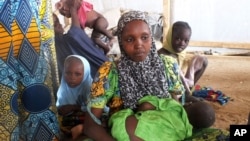The United Nations said it has started an emergency program to distribute planting seeds and medical aid as a food and health crisis looms in northern Cameroon. The region is hosting thousands of refugees and people internally displaced by Boko Haram fighting.
Najat Rochdi, coordinator of the United Nations systems in Cameroon, said the needs of about 50,000 Nigerians seeking refuge from the Boko Haram insurgency in Cameroon has continued to increase. She said the refugees need more food and medical care now that there is a food crisis and a cholera epidemic looming, so they have decided to launch emergency aid programs to support the refugees.
"The assistance is in different components. The first one is about food distribution, but we have also done seed distribution to rehabilitate the local agriculture. The assistance is also about access to water and sanitation. You know the rainy season is starting and obviously we need to make sure that there is this access without which there is a risk of having a huge cholera outbreak,” she explained. “It is also about health services and support and an important psychological support because of the trauma they have been through and support to education and local economy rehabilitation and all what is related to early recovery."
This year, the United Nations announced that it had requested $71 million to assist displaced people in Nigeria and neighboring countries but had received less than $ 7 million in donations. Rochdi said they urgently need the assistance to support host communities that are now struggling with limited resources.
"We need to remain vigilant. It is very important that we all mobilize ourselves, our partners, our donors in order to provide those communities and to provide these populations with the best assistance possible. There is a real trauma among these populations and it is so important actually that we show solidarity the way they did with the people they hosted," she said.
Essimi Menye, Cameroon's minister of agriculture and rural development told VOA they have been distributing planting seeds to farmers in host communities to improve production and reduce the effects of a looming food crisis.
"Having seeds is not a guarantee. You may have very good quality seeds but you need also to use them properly, so we have explained to our people in the field to tell farmers to first keep them in water for one night before planting," said Menye.
Cameroon estimates, in addition to the Nigerian refugees, there are over 100,000 internally displaced people in the country and said the figures have been stable since the Nigerian terrorist group Boko Haram staged a large scale attack in the country last February.




